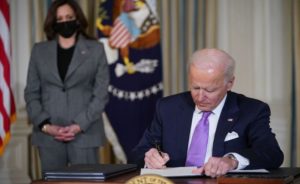
A federal judge rules that Texas cannot prosecute organizations that facilitate abortion access, the DEA proposes rules expanding telemedicine care, and more…
IN THE NEWS
- A federal judge temporarily blocked Texas prosecutors from enforcing current and 60-year-old state laws against organizations that help people travel out of state to have abortions. The court reasoned that the U.S. Supreme Court’s decision in Dobbs v. Jackson Women’s Health Organization did not revive the older laws—which included criminal penalties for individuals who aid or abet abortion—because they had been invalidated as unconstitutional by Roe v. Wade and therefore were implicitly repealed. The order will remain in place while abortion rights groups proceed with their lawsuit, in which they argue that Texas abortion laws violate their right to free speech and free travel. The executive director of Texas Equal Access Fund, Kamyon Conner, stated that the ruling affirms “the right of Texans to travel freely between states in order to access necessary health care.”
- The U.S. Drug Enforcement Administration (DEA) proposed two rules that authorize medical practitioners to prescribe certain medications via telemedicine without first conducting an in-person evaluation. The DEA found that many patients, including those who suffer from opioid use disorder, lack reliable transportation to access in-person care and the technological resources to attend appointments via video conference. Under the proposed rules, medical practitioners could prescribe via audio-only telemedicine medications with a moderate to low potential for abuse as well as treatment for opioid use disorder.
- The U.S. Senate voted to overturn a U.S. Department of Labor rule that allows, but does not require, retirement plan fiduciaries to consider environmental, social, and governance (ESG) factors when deciding how to invest—a measure that passed in the U.S. House of Representatives earlier this week. The Senate voted to repeal the rule under the Congressional Review Act, which gives Congress the power to repeal agency regulations. President Joseph R. Biden stated that he will veto the action, noting that “there is an extensive body of evidence that ESG factors can have material impacts on certain markets, industries, and companies.”
- The Labor Department and U.S. Department of Health and Human Services announced actions aimed at preventing labor exploitation of migrant children, citing a recent increase in child labor workplace violations. The new measures include improving the support migrant children receive when released to sponsors in the United States, such as helping children register for school, requiring follow-up calls to children who report safety concerns, and vetting adults who sponsor them. The agencies will also coordinate more aggressive investigations of child exploitation across the country, expanding beyond factories that illegally employ migrant children to include companies with child labor in their supply chains.
- Mississippi Governor Tate Reeves signed a bill into law that prohibits health care professionals and physicians from providing gender-affirming medical care, including surgeries and hormone treatments, to transgender youth. Reeves argued that youth struggling with gender identity can “find happiness in their own bodies,” and condoned proponents of gender-affirming care who encourage minors to pursue such procedures. The ACLU of Mississippi, which urged Reeves to veto the bill, contended that the bill “compromises the health and well-being of Mississippi youth” and impedes health professionals from providing “the only evidence-based treatment available for gender dysphoria.” Mississippi is the seventh state to ban gender-affirming care.
- The White House’s Office of Management and Budget (OMB) issued guidance instructing all federal agencies to remove the social networking application TikTok from all information technology operated by the agencies or used by agency contractors. Under the guidance, OMB allows exceptions for law enforcement, national security, and research purposes. OMB issued the guidance following the Consolidated Appropriations Act, 2023 directive to prohibit the use of TikTok on federal government devices. Federal Chief Information Security Officer Chris DeRusha explained that the ban is part of the Biden Administration’s efforts to limit “foreign adversaries’ access to Americans’ data.” TikTok Head of Policy Communications for the Americas, Brook Oberwetter, argued that Congress enacted the ban “without any deliberation” as “little more than political theater.”
- Senator Marco Rubio (R-Fla.) reintroduced a bill to make daylight saving time permanent. The bill aims to end the traditional, twice-annual changing of the time by setting clocks forward an hour on Sunday, March 12, 2023, and permanently maintaining that time. Sleep experts advocate the elimination of daylight saving time because evidence demonstrates an increased risk of adverse physical and mental health outcomes when the clock is set back an hour each year. Rubio explained that “locking the clock has overwhelming bipartisan and popular support.”
- The U.S. Food and Drug Administration (FDA) announced an import alert that aims to restrict the import of xylazine, an animal tranquilizer that has been found in illicit drugs such as fentanyl and heroin. The import alert subjects imported xylazine to heightened FDA scrutiny by authorizing FDA staff to detain any shipments of xylazine that are not clearly labeled for a legitimate use. FDA explained that although xylazine has legitimate veterinary uses, it may lead to overdose deaths in people when mixed with illicit drugs.
WHAT WE’RE READING THIS WEEK
- In a Tax Policy Center report, Janet Holtzblatt, senior fellow at the Tax Policy Center, and her coauthors, suggested that Black married couples pay more tax costs than white married couples even though federal income tax forms have no requirement to identify race. Holtzblatt and her coauthors explained that tax “marriage penalties”—which occur when married couples owe more income tax when filing jointly than they would if they filed separately—are more likely when both spouses work, make similar incomes, and have dependents. Since Black couples are more likely to live in a two-income household, earn the same amount as the other, and have children, they are more likely to face marriage penalties, argued Holtzblatt and her coauthors. Holtzblatt and her coauthors concluded that differences in marriage penalties may reinforce racial disparities by reducing Black couples’ after-tax income and their ability to build wealth relative to white couples.
- In a Race Forward and PolicyLink report, researchers analyzed federal agencies’ Equity Action Plans, which are supposed to outline how agencies will address barriers to equal participation in federal programs due to systemic racism. The researchers found, however, that only half of the plans studied mention “racial equity” and only three plans explicitly discuss “institutional racism” and “structural racism.” The researchers urged all agencies to be explicit about plans to address systemic racism and encouraged the agencies to adopt a uniform format in order to enable public accountability.
- In an article, Oren Perez, professor at Bar-Ilan University, and Michael P. Vandenbergh, professor at Vanderbilt University Law School, argued that existing regulations governing corporate pledges to reduce greenhouse gas emissions fall short of ensuring that corporations uphold their commitments. Vandenbergh and Perez urged policymakers and climate advocates to endorse private enforcement mechanisms instead of relying solely on public regulation to hold corporations accountable. For example, Vandenbergh and Perez proposed that banks issue a “carbon letter of credit,”—a contractual agreement that holds companies financially liable to a third party if they fail to meet their emission reduction goals—when funding climate-mitigation projects.
EDITOR’S CHOICE
- In an essay in the The Regulatory Review, Allison K. Hoffman, professor at the University of Pennsylvania Carey Law School, and Simone Hussussian, then a recent graduate of the University of Pennsylvania Carey Law School, argued that states expanded access to medical care during the COVID-19 pandemic after the federal government failed to do so. Hoffman and Hussussian explained that many states made it easier for people to enroll in Medicaid by, for example, eliminating enrollment fees. In addition, Hoffman and Hussussian noted that states expanded access to virtual medical appointments and allowed out-of-state physicians to provide these telehealth services. Hoffman and Hussussian concluded that states responded to federal inaction by using “the tools under their control” to increase health care access.



